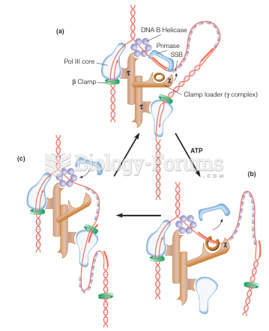|
|
|
The Centers for Disease Control and Prevention (CDC) was originally known as the Communicable Disease Center, which was formed to fight malaria. It was originally headquartered in Atlanta, Georgia, since the Southern states faced the worst threat from malaria.
Sildenafil (Viagra®) has two actions that may be of consequence in patients with heart disease. It can lower the blood pressure, and it can interact with nitrates. It should never be used in patients who are taking nitrates.
Methicillin-resistant Staphylococcus aureus or MRSA was discovered in 1961 in the United Kingdom. It if often referred to as a superbug. MRSA infections cause more deaths in the United States every year than AIDS.
Common abbreviations that cause medication errors include U (unit), mg (milligram), QD (every day), SC (subcutaneous), TIW (three times per week), D/C (discharge or discontinue), HS (at bedtime or "hours of sleep"), cc (cubic centimeters), and AU (each ear).
In the ancient and medieval periods, dysentery killed about ? of all babies before they reach 12 months of age. The disease was transferred through contaminated drinking water, because there was no way to adequately dispose of sewage, which contaminated the water.
 An intra-aortic balloon pump increases circulation to the coronary arteries and decreases the worklo
An intra-aortic balloon pump increases circulation to the coronary arteries and decreases the worklo
 A pump showing regular with a pump octane of 87, plus rated at 89, and premium rated at 93. These ...
A pump showing regular with a pump octane of 87, plus rated at 89, and premium rated at 93. These ...
 This severely corroded water pump could not circulate enough coolant to keep the engine cool. As a ...
This severely corroded water pump could not circulate enough coolant to keep the engine cool. As a ...





